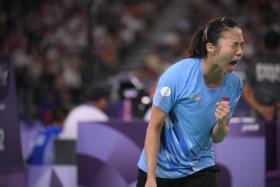How the medal money is spent
Contract bridge team hope MAP windfall will be used on coaches, other athletes set sights on other meets
They made history by winning a gold medal at the Asian Games, but the Singapore men's contract bridge team did not even have funds to hire a coach to prepare them for the continental meet.
Thanks to the $320,000 they will earn under the Singapore National Olympic Council's (SNOC) Multi-Million Dollar Award Programme (MAP) for winning an Asiad gold, they are hoping that the younger generation of bridge players will not suffer the same fate.
The scheme rewards athletes with monetary awards based on their achievements and stipulates that they have to return 20 per cent of the amount to their national sports associations (NSAs) for future training and development.
The contract bridge team hope that the sum returned to NSA will help the sport grow in the country and also be used to engage coaches to guide the younger generation of players.
The reward also comes in handy for the sextet- captain Loo Choon Chou, Poon Hua, Zhang Yukun, Fong Kien Hoong, Desmond Oh and Kelvin Ong - who are self-funded.
It will help to cover some of their expenses, which include taking part in overseas tournaments.
Poon said on their return to Changi Airport yesterday: "We hope that this performance in the Asian Games will help to raise the awareness of the game among the local community, especially the younger generation."
The highest earner among Team Singapore's four gold, four silver and 14 bronze medallists was swimmer Joseph Schooling, who will pocket $340,000 from his two individual gold medals and two relay bronzes.
One of Singapore's silver medallists was swimmer-turned-ju-jitsu exponent Constance Lien. She finished second in the women's 62kg category as the martial art made its Asiad debut, just like contract bridge.
WORLD CHAMPION
Lien, 19, now has her sights set on becoming a world champion in June next year.
To get there, the Temasek Polytechnic final-year student already has plans to put her studies on hold for a year.
The $100,000 that she will earn from her achievement at the Games is an added boost that will help to cover her training costs, which amounts to about $3,000 annually.
Participation at international tournaments can also cost up to a few thousand dollars at a time.
Said Lien: "Ju-jitsu is not a very recognised sport in Singapore, so I hope that improves after Asian Games. Before that, everything was taken care of by my parents."
The reward has also given Roanne Ho the chance to continue to use swimming as a form of encouragement for the younger generation, without having to worry about her financial situation.
Ho, who is a full-time swimmer, will pocket $100,000 for winning a silver medal in the 50m breaststroke event, setting a national record of 31.23secs.
Earlier this year, the 25-year-old was still uncertain of her future in the sport but has since committed to swimming for another year.
Sailing duo Kimberly Lim and Cecilia Low, meanwhile, inched closer to their Olympic dream after sealing their victory in the 49erFX event with a day to go.
Their success at the Asiad has only fueled their determination to achieve their ultimate goal of competing in the Olympics.
Low said: "It's a stepping stone to the Olympics. It's also a confidence booster for us to train harder to reach our final goal."
While the duo's expenses are covered by the Sports Excellence Scholarship, the $320,000 reward will come in handy with additional costs like equipment.
Lim said: "Sailing is always an expensive sport, so it definitely helps, and we are grateful that we receive recognition from the country."
But some sports endured underwhelming campaigns in Indonesia.
The women's bowling team failed in the defence of their team title, finishing in seventh place, while the paddlers took home a solitary medal - Yu Mengyu's joint-bronze in the women's singles.
However, Singapore Table Tennis Association president Ellen Lee remained satisfied with their showing.
She said: "For all the paddlers, the performance was good because at the Asian Games, we're meeting the world's best.
"To be able to advance that far up the stages, and also losing by very small margins, I think overall we have done well."
Get The New Paper on your phone with the free TNP app. Download from the Apple App Store or Google Play Store now


